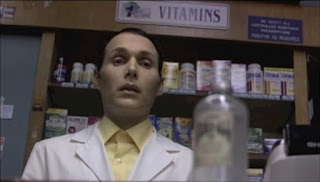Danton (Andrzej Wajda, 1983, France/Poland)
Shot during Andrej Wajda’s period of self-exile during the 1980s, Danton is certainly one of the more unique films in the Polish auteur’s canon. Based on 1929 Polish play written by Stanislawa Przybyszewska, the film was shot in France with a mixed cast of French and Polish actors. Curiously, Wajda cast all of his Polish actors as supporters of Maximillien Robespierre, and all of his French actors as supporters of the titular Danton. Surely this was intentional, and while Wajda apparently denied the presence of a political allegory in the film, the parallels to the events of the film with the recent situation in Poland are strong.
Gerard Depardieu’s earthy, proletarian portrayal of Danton has clear echoes of Lech Walesa, the idealistic worker who led the popular revolution in Poland. Likewise, Wojciech Pszoniak’s ascetic and somewhat sickly portrayal of Robespierre is reminiscent of General Wojciech Jaruzelski, the President of communist Poland who was instrumental in imposing martial law in Poland in December of 1981. The script (which includes contributions from Bunuel collaborator Jean-Claude Carriere and Agnieszka Holland, among others) is less concerned with the historical context of the French Revolution, and more concerned with the dueling personalities. Depardieu’s Danton is a stand-in for the populist optimism and idealism of all revolutionary movements, while Pszoniak’s Robespierre stands in for the realpolitik all such movements adopt over time.
Danton is a visually dynamic film, filled with striking vignettes despite its limited budget. Wajda brings to life the grime and sweat of the moment with an almost documentary-like approach. Adding to the atmosphere is the unsettling Kubrickian score from Jean Prodromides. Depardieu is excellent as Danton, bringing an intensity and physicality to the role. Pszoniak provides a great counterpoint. The confrontation between the two men over a dinner meeting is one of the highlights of the film.
8/10



Comments
Post a Comment